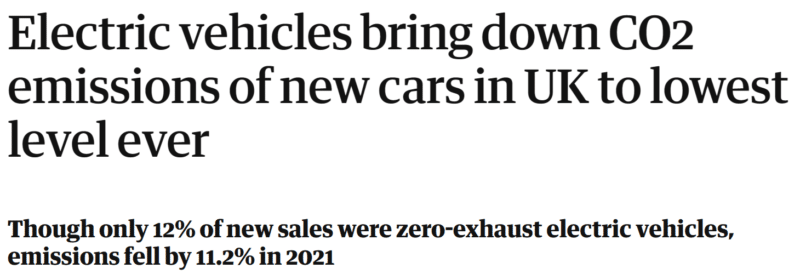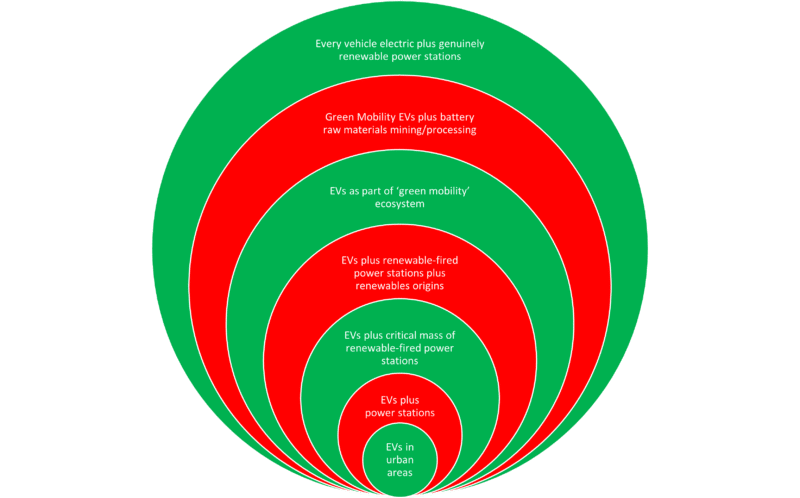
I have a friend who’s been carrying around this Guardian headline since February. Using the article wherever he can to justify his fervent belief that Electric Vehicles are good for the planet. He hasn’t, to the best of my knowledge, quite grasped the concept of confirmation bias. In the same way I suspect the Guardian journalist didn’t allow the small matter of fact get in the way of a heartwarming story for their ‘liberal elite’™ audience.
The constant problem with these kinds of story is that, by redrawing the system boundaries, its always possible to get the answer you want. I’m not sure the journalists quite get it, but I’m very sure the ‘scientists’ behind the scenes do. While I (sometimes) admire their intentions, the right and proper job of science is first and foremost about presenting the objective facts right. Which in turn means framing the right system boundaries, rather than using the boundaries that best make the subjective, political point that ought to be the business of others.
System boundaries are all about defining what we are going to include and what we are going to exclude from our calculations. Most times, system boundaries relate to physical space. Such that, for example, if we draw the EV system boundary around purely urban areas, then EVs are indeed ‘better’ than conventionally powered vehicles. The implication contained within the word ‘better’ is that we mean ‘better for the planet’. That’s where the calculation switches from being merely naïve to active disingenuity. Taking a measure of EVs benefits within a tightly controlled boundary and then extrapolating the result to include everything outside that boundary takes us beyond lies and damned lies. The power needed to charge the batteries has to come from somewhere, and that somewhere is all the places outside the urban areas. If do the ‘fair’ thing, we need to include the power stations in the calculation. The reason I imagine the pro-EV lobby are reluctant to do this is because they know that the thermal efficiency of the vast majority of power stations is lower than that of the vast majority of the petrol or diesel engines found in our cars. Which means that, with the system boundary redrawn to include the power stations needed to provide the electricity to charge the batteries, EVs are currently objectively worse than petrol or diesel vehicles.
The pro-EV lobby, would no doubt then come back with another argument. Probably one that says something like, ‘yes, but, in the future, the power grid will be increasingly supplied with renewable energy sources’. And they would be right. We can extend system boundaries in both space and time dimensions, and on the latter front, sure enough, at some point in the future, when renewable energy crosses a threshold percentage of the total grid, EVs will then become ‘better’ again.
Yet, again, though, that’s not the end of the story. Merely another system boundary shift. One that the pro-oil lobby will no doubt rebut with their next ‘yes, but’ challenge. Here’s what such a tit-for-tat sequence of boundary expansions might look like if allowed to play out in full:
If the system boundary is drawn around urban areas, EVs are ‘better’ for the environment than conventional
If the system boundary is extended to include the power stations that generated the electricity to charge the EV batteries, EVs are worse than conventional.
If we extend the system timeframe boundary to include future power generation infrastructure that includes more renewables, EVs are better than conventional.
If we extend the system boundary to include the full renewables story (e.g. the literal insanity of cutting down Canadian forests and shipping woodchips to Drax), EVs are worse than conventional.
If we extend the timeframe again to a time when the transport ecosystem shifts away from private ownership to ‘green-mobility’ (e.g. Uber, Ola, Lyft, etc), EVs are better.
If we extend the system boundary to include the complete battery production story (from finding the lithium and getting it out of the ground), EVs are worse.
If we project into a future where every vehicle is electric and all electricity generation is from genuinely-renewable renewables, EVs are better. (i.e. in the end, per the TRIZ trend, everything evolves to ‘electrical’ rather than mechanical)

Extend the system boundaries to include the full, ‘right’, planetary space and time dimensions and we reach a conclusion that EVs will indeed be better in the long run than oil-based vehicles. I suspect some (TRIZ-aware) scientists know this, and in order to ‘avoid confusing the public’ choose to simplify their arguments. On some level, I can see the sense in this. But, when you know that there is a rival gang of scientists representing a different (partial) view of the world, the only result of telling half-truths is complete falsehood. In other words, define the right boundaries, take out the spin, and tell the right story from the get go.

